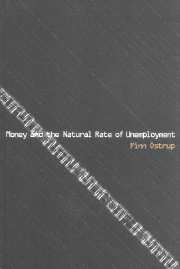Book contents
- Frontmatter
- Contents
- Preface
- Part I Introduction and main assumptions
- Part II The impact of monetary policy and inflation
- 4 Imperfect integration of securities markets
- 5 Monopolistic competition in bank markets
- 6 Utility from securities holdings
- 7 Hysteresis effects from monetary policy
- 8 The impact of inflation on bank earnings
- Part III The impact of monetary regimes
- Part IV Policy implications
- Appendix: Microeconomic foundations
- Bibliography
- Index
4 - Imperfect integration of securities markets
Published online by Cambridge University Press: 22 September 2009
- Frontmatter
- Contents
- Preface
- Part I Introduction and main assumptions
- Part II The impact of monetary policy and inflation
- 4 Imperfect integration of securities markets
- 5 Monopolistic competition in bank markets
- 6 Utility from securities holdings
- 7 Hysteresis effects from monetary policy
- 8 The impact of inflation on bank earnings
- Part III The impact of monetary regimes
- Part IV Policy implications
- Appendix: Microeconomic foundations
- Bibliography
- Index
Summary
Introduction
This chapter demonstrates a monetary impact on production in a model based on wage and price flexibility and rational expectations when there is imperfect integration of markets for securities denominated in different currencies. The wage setters set the nominal wage to reach an optimal trade-off between the real wage and production. The model analyses an equilibrium in which production increases at a constant rate and holdings of financial assets lie at constant levels relative to nominal production.
The analysis shows that monetary policy, working through inflation, sterilised intervention, and/or capital restrictions, has an impact on natural unemployment. This means that money is non-neutral. Monetary non-neutrality arises because inflation, sterilised intervention, and capital restrictions affect the portfolio composition of securities denominated in domestic and foreign currencies. This in turn determines the return on domestic securities relative to foreign securities and thus the real interest rate. The real interest rate influences natural production through two channels: (i) through an impact on the demand for goods and thus on the real exchange rate which affects the wage setters' trade-off between the real wage and employment, driving a wedge between the consumer price and the producer price, and (ii) through capital accumulation, a lower real interest rate causing an increase in the capital stock and thus in the real wage, inducing wage setters to opt for higher production.
- Type
- Chapter
- Information
- Money and the Natural Rate of Unemployment , pp. 69 - 101Publisher: Cambridge University PressPrint publication year: 2000



